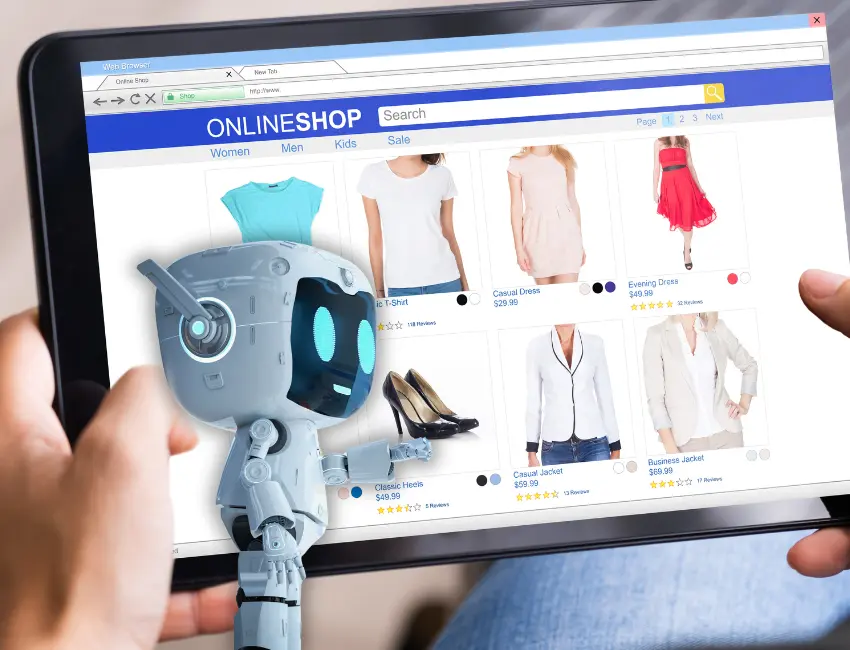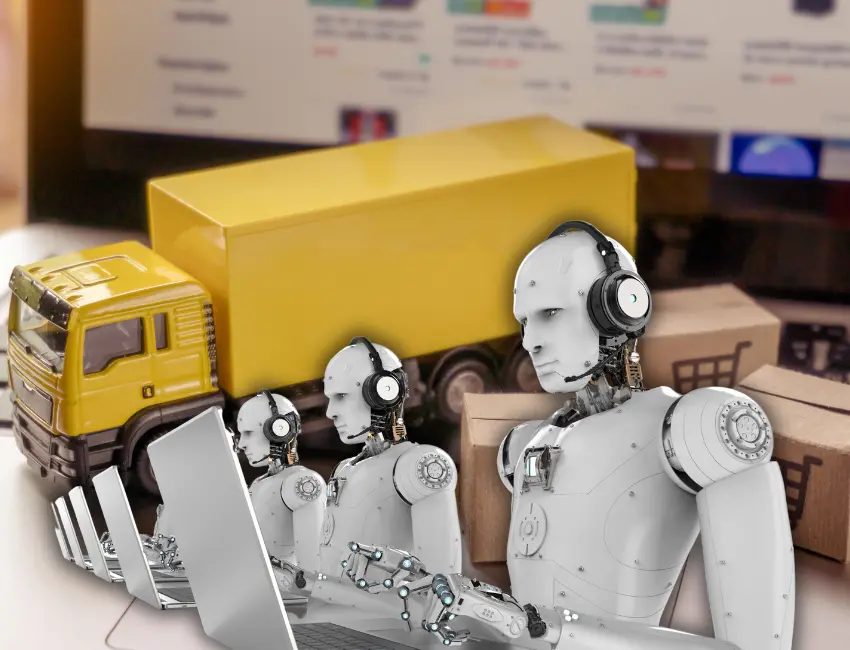

AI powered eCommerce uses machine learning to personalize shopping, automate support, optimize pricing, and forecast demand. It enables real-time customer insights, improves product discovery, and increases conversion rates. Retailers implement AI to enhance efficiency, reduce costs, and deliver a seamless shopping experience across channels.
Online shopping isn’t something new anymore. It’s just part of daily life. People buy clothes, electronics, and lots of other things with just a click. But have you ever thought about everything happening behind the screen to make this shopping experience faster and much more personal? That’s where AI-powered ecommerce comes into play.
It could be used in the simplest form of chatbots or by displaying “other people also bought” suggestions. AI applications in ecommerce can change store operations from product search and customer service to stock planning.
Let’s define AI-powered ecommerce, and detail how it benefits both the customer and the business. Let’s understand why now is the best time to use it with your online store.
AI-powered ecommerce means using smart technology to make online shopping better. It includes tools like machine learning and automation.
AI makes online shopping easier and more personal. It doesn’t show everyone the same products. AI learns what each customer likes and shows them products that fit their interests. This helps people find what they want faster..
Every visit feels more useful because the store learns and improves with each customer’s choices. This means the store can:
Whether you are running a big box store or simply starting fresh, an AI powered ecommerce store enables you to operate at hyper-speed and truly service your customer.

Let’s look at how AI helps at each step of the online shopping journey.
In the past, every customer saw the same homepage. But now, stores use AI-powered ecommerce personalization to show what each person wants to see.
Let’s say you often buy eco-friendly products. The AI will learn this and show you more green and sustainable items. Your homepage might be full of sneakers and gym wear if you love sporty clothes. This makes shopping easier and more fun. It also helps stores sell more.
Have you ever searched for something on a website and found nothing useful? That’s because many search bars only work if you type the exact words.
With AI-powered ecommerce search, things are different. You can type something like “blue dress for wedding” and the AI will understand your meaning even if those exact words don’t match the product names. It also fixes spelling mistakes and guesses what you’re trying to find. This saves time and keeps shoppers happy.
Curation means picking and showing the right mix of items. In stores, a stylist might do this, but online, AI-powered ecommerce curation does it instead.
The AI looks at your past orders, the season, and even trends. Then it creates special collections just for you. It’s like having a personal shopper who knows your style.
These days, a website is not enough. A good AI-powered ecommerce platform helps you run your whole business better. It can:
Big names like Shopify and Salesforce now offer AI features like smart promotions and demand forecasting. And the best part? Even small businesses can use these tools now.
Using AI is not just about looking modern. It brings real results. Here’s how it helps ecommerce brands:
When customers get smart suggestions, better search results, and personal collections, they’re more likely to buy. And if they find what they want quickly, they may buy more than they planned. This helps increase your sales.
AI can do many tasks that used to take a team of people. This includes tasks like tagging products, answering questions, or tracking stock. This saves time and money for your business.
AI can predict what’s going to be popular. This helps you order the right products at the right time. It means fewer sold-out items and less wasted stock sitting in storage.
AI makes the shopping experience smoother. When customers feel like the store understands them, they’re more likely to return. This builds loyalty and also repeat sales.
AI tools show you what’s working and what’s not. You get reports on what people click, where they leave the site, and which products do well. This helps you improve your store over time.

Customer service used to mean emails or long phone calls. But now, thanks to AI, stores can help customers instantly. Smart chatbots are always ready to answer questions.
AI customer support can:
This is really useful for stores that sell clothes, furniture, or home decorations. The best part about using AI is that these bots learn and get better over time. The more they talk to customers, the smarter they become.
One of the most exciting features of AI-powered ecommerce is visual search. Let’s say you see a jacket on Instagram that you like. Instead of typing out a description, you can upload the photo to the store and the AI will show you similar products.
This is really useful for stores that sell clothes, furniture, or home decorations. Customers don’t need to explain. They just show the image and the AI does the rest.
Let’s look at how big companies use AI in their ecommerce strategy:
Sephora uses AI to give makeup and skincare advice. Their chatbot asks about your skin type and past purchases, then recommends what suits you best.
ASOS lets you upload a photo of clothing and find similar items on their site. They also use AI to guess your size based on your order history.
H&M uses AI-powered ecommerce curation to show products based on weather, location, and local trends. A shopper in Mumbai sees different products from someone shopping in London.
Nike uses AI to suggest shoe styles and even designs the perfect fit for you. They also use it to improve their app experience and customer journey.
AI brings many benefits, but there are a few challenges to think about:
AI works best when it uses customer data. So stores must follow privacy laws and protect this data carefully.
If you’re using old systems, adding AI might need some technical help. But many modern tools are easy to install and use.
Some AI features can be expensive at first. But the time and money you save later usually make up for it.
AI is smart, but not perfect. Sometimes it shows the wrong suggestions or misunderstands customer needs. This is why human checks are still important.
Online shopping is getting faster, and more personal. Customers expect stores to remember their likes, suggest good options, and deliver quickly.
AI-powered ecommerce helps stores meet these needs. It’s not just a trend. It’s becoming a must. The brands that use AI now will grow faster and offer better service than those that don’t.
Even small businesses can use these tools now. You don’t need a tech team. You need just the right platform and a plan.
At WebOsmotic, we help brands build smart, and modern online stores. Our team knows how to use the best AI tools to make your store easy to use and fun to shop.
Here’s what we can do for you:
We’ll build a solution just for you no matter what you’re selling.
AI-powered ecommerce is changing everything. Shopping will get easier for customers and smarter for businesses. AI ecommerce personalization and smart chatbots make your store faster and more profitable.
You don’t have to be a tech expert to start.. With the support of WebOsmotic, your store can get on the path to the right use of AI quickly and affordably.
So if you are looking to grow your online business, enhance the customer experience, and save time, AI is the way. And WebOsmotic is here to help like no other AI developing agency out there.